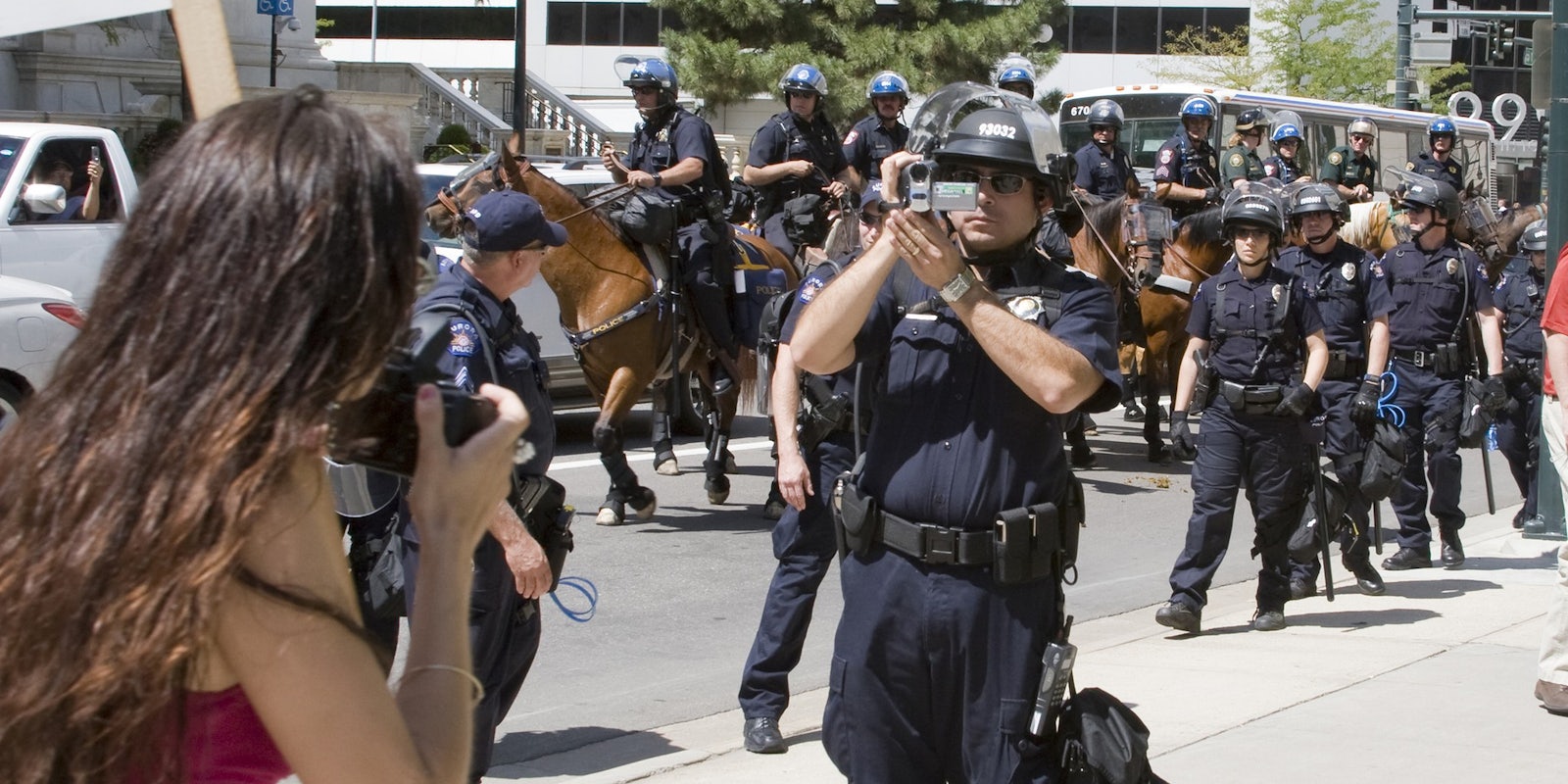In May, Denver police spent at least $30,000 on surveillance software designed to monitor and collect social media posts across at least a dozen networks, according to police records.
Documents acquired by Daily Dot under the Colorado Open Records Act include an invoice to the Denver Police Department from Geofeedia, Inc., a startup whose location-based surveillance wares are exhibited at national security and law enforcement summits across the country.
Geofeedia’s products—one of a dozen or so nearly identical online tools employed by U.S. law enforcement on a daily basis—include a powerful platform for the interception, aggregation, and storage of online posts across multiple social media networks.
With Geofeedia, Denver police have acquired the ability to simultaneously monitor posts on Facebook, Twitter, YouTube, Instagram, Vine, Periscope, and Flickr, among others. Its location-based search capabilities enable police to vacuum up nearly every social media post emanating from within specified geographical boundaries. The tweets, photos, videos, and live broadcasts of anyone identified by the software within the area are intercepted and recorded by police through a process developers call “geo-fencing.”
Purchase and requisition paperwork for Geofeedia show Denver police purchased 30 subscriptions to the company’s platform using $30,000 in confiscated funds, which was approved by the city’s Property Confiscation Board in March. Approval for the use of seized assets in this purchase was approved directly by Denver Police Chief Robert White, records show.
Tools like Geofeedia offer police the ability to conduct real-time social media surveillance during mass shootings or terrorism events. They are also capable of sucking up copious amounts of data about criminals and innocents alike, information which can then be stored by authorities for later use. (Police records cited by the Baltimore Sun earlier this month describe how Baltimore police are using Geofeedia to archive social media posts in a secure data warehouse.)
Denver P.D. denied the Daily Dot access to records concerning the types of social media posts it has acquired through Geofeedia’s platform, describing the posts as “confidential intelligence information.” A request for access to any training materials, or paperwork that would describe the software’s functionality, was also denied. According to police, “the proprietary interests of the manufacturer outweighs any public purpose to be served by release” of said records, if they exist. While exempting certain records about social media monitoring from disclosure, Denver P.D. also cited confidential “tactical, strategic, and investigative information.”
“In the U.S. we’ve never had a secret police that circulates around civil society just looking for anybody saying anything suspicious. We shouldn’t have an online equivalent either.”
A police spokesperson did not respond to a request for comment about Geofeedia or the allocation of confiscated funds used to purchase its platform. In the past, police departments have defended the use of such software, promoting in particular its ability to identify eyewitnesses to crimes who might have otherwise never come forward. It may also be used to locate guns in schools or identify the sources of illegal drug activity.
Jay Stanley, a senior policy analyst at the American Civil Liberty Union (ACLU), said that while platforms like Geofeedia have practical uses, the public should be wary of how they are used. “Even though you obviously don’t need a warrant to read stuff that’s been published for the world to see, that doesn’t mean—as a policy matter—it’s a good idea for us to give our police license to engage in mass social media monitoring.”
Stanley, who works at ACLU’s Speech, Privacy, and Technology Project, also warned of the potential “chilling effect” on First Amendment activities “when we realize there might be a law enforcement officer looking over our shoulder as we post things online. In the U.S. we’ve never had a secret police that circulates around civil society just looking for anybody saying anything suspicious. We shouldn’t have an online equivalent either.”
In addition to Geofeedia actively working to defeat the privacy controls offered to users by sites like Facebook, its current monitoring software is able to correlate data from more than a dozen networks simultaneously. Individually the posts it collects might be garbage, but in aggregate, over a long enough period of time, the data generated by an active social media users begins to paint an intensive portrait of that person’s identity, their interests, habits, and political affiliations; information that, if not entirely misleading, may not be so wittingly surrendered after all.
“There could definitely be a mosaic effect in which different pixels of information about you can be put together into a higher resolution view of your life,” says Stanley. “That’s one reason why people need to be very conscious and aware of what they are posting online, and why, as a policy matter, we should put in place rules that stop police from trawling around in social media without good reason.”
In a statement, Attorney Stephanie Lacambra of the Electronic Frontier Foundation (EFF) described the use of social media monitoring by police departments as “incredibly troubling for the preservation of individual privacy.”
“I often run into the widespread misperception that ‘because I’m not doing anything wrong,’ or ‘I have nothing to hide,’ ‘digital privacy doesn’t concern me,’” Lacambra said. “This perspective is troubling because it fails to grasp the power of information in the digital age and its potential for abuse—by law enforcement and others.”
According to TechCrunch, Geofeedia raised approximately $17 million in funding at the beginning of the year. While not mentioning its law enforcement ties, the website noted Geofeedia had acquired “200 new customers in 2015” while experiencing “250 percent year-over-year” growth in revenue. The report listed among its private industry clients Dell, CNN, Mall of America, and the NCAA.
Geofeedia did not immediately respond to a request for comment.
Contact the author: Dell Cameron, dell@dailydot.com
